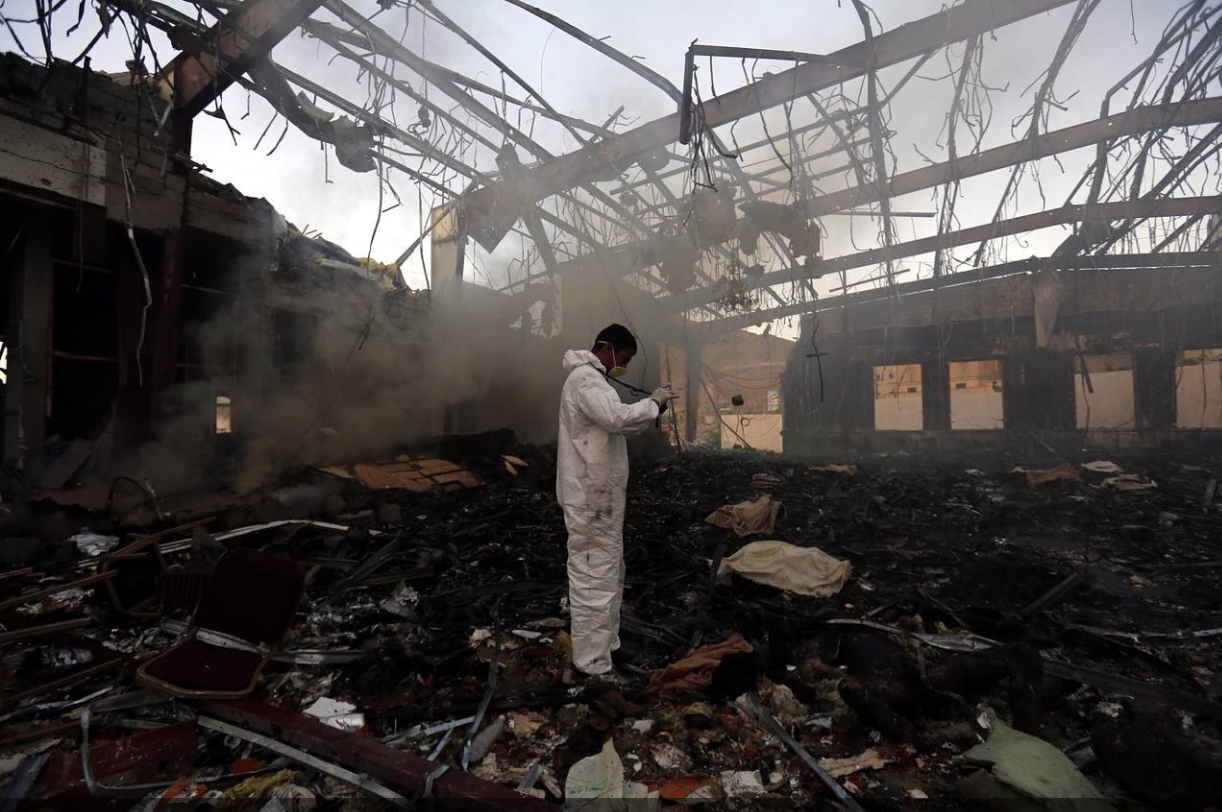
forensic expert inspects the site of an airstrike that hit a funeral ceremony in San’a, Yemen. PHOTO: EUROPEAN PRESSPHOTO AGENCY
More Than 140 Dead After Airstrike Hits Funeral in Yemen’s Capital
Saudi-led coalition blamed for airstrike as search for victims gets under way
Families in Yemen searched Sunday for victims of an airstrike that the United Nations said had killed more than 140 funeral mourners and wounded hundreds more, prompting the U.S. to begin a review of the Saudi-led military campaign.
Alaa al-Khazan was among those who said he had been searching hospitals in the capital San’a, looking for his cousin, following the strike.
“We have seen him on television among those brought out of the targeted hall, but we cannot find him,” he said.
Residents near the bombing have accused Saudi Arabia’s military coalition of carrying out the strike on the hall in the Yemeni capital, which also wounded 525 people, according to the U.N. Office for the Coordination of Humanitarian Affairs in Yemen. People had gathered to mourn the father of Interior Minister Jalal al-Ruwaishan, an ally of the Houthis who the Saudis are trying to dislodge from power in Yemen.
A Saudi coalition spokesman, Maj. Gen. Ahmed Asiri, said Saturday that the coalition has “avoided such gatherings” and that “other causes of bombing” should be considered.
The bombing marks the latest case where the Saudi-led coalition of mostly Sunni Arab allies has come under scrutiny for a suspected airstrike that resulted in a high civilian death toll. Such attacks have strained U.S. support for the Saudi campaign in Yemen, spurring lawmakers to explore ways to curb $1.15 billion in arm sales to the kingdom. Now President Barack Obama’s administration is also considering how it might support to the coalition, which has included intelligence-sharing and the vetting of military targets,
“U.S. security cooperation with Saudi Arabia is not a blank check,” said National Security Council spokesman Ned Price on Saturday. “Even as we assist Saudi Arabia regarding the defense of their territorial integrity, we have and will continue to express our serious concerns about the conflict in Yemen and how it has been waged.”
Saudi-American U.S. ties are already being tested on several other fronts. A landmark nuclear deal between Iran, Saudi Arabia’s regional rival, and world powers including the U.S. angered the Saudi monarchy.
The U.S. and Saudi Arabia are also at odd over how aggressively to back Syrian rebels seeking to oust Syrian President Bashar al-Assad, who is supported by Russia and Iran. Saudi Arabia has offered to dispatch ground troops in their effort, but the U.S. has been cautious about widening the conflict any further.
And earlier this month, U.S. lawmakers voted to allow families of Sept. 11 victims to sue Saudi Arabia, despite objections from the White House and the Saudis’ major lobbying effort against the law.
The Saudi-led military coalition resumed conducting airstrikes in Yemen in August, after political talks to end the conflict stalled once again. It aims to unseat the rebels, who are backed politically by Iran, the kingdom’s rival for power in the region.
Yemeni airspace has been in the control of coalition jet fighters since it started launching airstrikes in March 2015.
Residents of San’a on Saturday described charred bodies inside the building where the funeral took place. “Tens of ambulances and ordinary cars were loaded with [gravely] wounded people and corpses,” said witness Bashar Ismaeel.
“The Saudi-led coalition are responsible of killing [them] as they are the only ones that have jet fighters in the Yemen conflict,” said Sultan al-Salihi, who said a cousin and his son had both been killed in Saturday’s strike.
In a statement, the Saudi-led coalition said its forces have “clear and explicit instructions to avoid targeting civilian sites and take all measures to spare civilians.” Military experts from the U.S. will take part in “an investigation to be conducted immediately” into the incident, it added.
Saudi Arabia’s tightly controlled media said Sunday that the coalition hadn’t carried airstrikes in the area around the funeral hall, calling the bombing “score settlement” between the Houthis and their Yemeni allies.
The size of the attack, however, has prompted aid groups to scramble in assisting the injured and transport the dead.
“We’re mobilizing to support health facilities deal with the influx of dead and wounded. 300 body bags & medical supplies on the way,” tweeted the Yemeni arm of the International Committee of the Red Cross.
Medical-aid group Doctors Without Borders tweeted that hospitals it supports in San’a had treated more than 400 wounded people.
Houthis and supporters of former Yemeni leader Ali Abdullah Saleh, who is allied with them, organized a demonstration in front of the U.N. offices in San’a on Sunday morning, with organizers calling on the U.N. to hold the Saudis accountable for what they called a “brutal crime.”
U.N. Secretary-General Ban Ki-moon condemned the weekend attack and called for a “prompt and impartial” investigation into the incident.
“Any deliberate attack against civilians is utterly unacceptable,” he said in a statement Saturday.